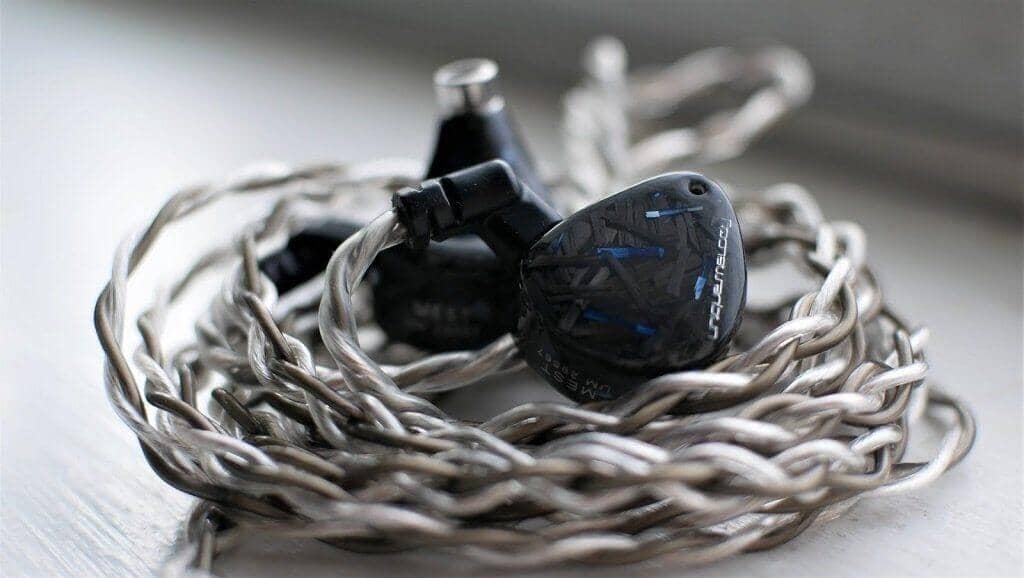Unique Melody MEST Review

Review written by Anthony Nguyen (@Antdroid)
Unique Melody’s brand name has always been what I’d call appropriate. They’ve always never been shy of thinking well outside the box and coming up with very unique in-ear monitor ideas, from crazy design choices, to using unique drivers, such as the planar driver in the ME1, which I own, and to using additive manufacturing to produce a crazy web of titanium for a custom IEM shell.
UM’s latest model, the MEST, is yet another product that shows they aren’t afraid of trying something fresh and new. This IEM is features 4 separate driver technologies in a single unit. The IEM includes a single dynamic driver, 4 balance armatures, 2 electrostatic tweeters, and a bone conductor driver. Yes, I am not making that up. They added bone conduction to this foray.
Let me just quickly thank Unique Melody themselves for allowing me to participate in this MEST tour. I was able to listen to this IEM for a week’s time before shipping it to the next user on the Head-Fi Loaner tour.
Now back to this interesting setup. I’ve only tried a few bone conducting earphones in the past with my experience primarily around the Aftershokz. This popular bone conducting earphone seems to be pretty popular with the bicycle commuter crowd, as everyone I’ve met that owns them is bicyclist of some sort. They earphones themselves do work, and whatever voodoo it does actually produces music in my head, and that’s pretty rad. They aren’t really great for audiophiles though, as you do lose quite a bit of resolution and some technical performance, and my experience equates them to somewhat mediocre to poor audio performance, but it still produces music that is listenable and not terrible.
I was most interested in how UM was going to implement this driver, while at the same time pack in the others as well. The EST drivers for example, have been rather poorly used in most all IEMs that have featured them outside of a few very niche products that cost well over $3K USD (The Vision Ears Elysium and Elysian Audio Annihilator). What surprised me while reading the promotion pieces on the bone conductor driver was that UM targets this driver to handle the upper mid-range and lower treble duties, which wasn’t at all what I was expecting. But remembering how Aftershokz sound, it does make some sense.
Accessories
Before I get too deep into the whole sound thing, I do want to quickly mention the package the UM MEST comes with. The small package box was a lot smaller than my previous UM IEM packaging, which was a large wooden box – this time Unique Melody ships in a smaller cardboard box that’s sleek and elegant. Inside, the IEM comes with a leather blue and black zippered case that looks quite attractive and neatly has the UM branding on it, though looks far from distasteful. Included is a braided cable that does feel a little thick, but I didn’t find it too heavy in actual usage. The cable is terminated in 2.5mm balanced, but also came with 4.4mm and 3.5mm attachments, which may be exclusive for this tour unit. I believe users will get to choose the termination of their choice if ordered.
Sound
When I first popped on the Unique Melody MEST, my first thoughts were that it sounded slightly W-shaped with a raised low end and some sort of peak in the lower treble, although it sounded semi-neutral, but colored in some ways. Generally, I found the signature unique, and fits somewhere between a balanced U-shape and a more fun V-shaped sound.
One thing to point out is that I found the MEST to be highly tip dependent on first tests. With certain tips, perhaps something to do with seal, I found that the MEST was very bright and lacked low end bass, while with other tips, the bass can actually be rather overwhelming.
After listening to it for a few days now, I think the MEST to be a unique yet very fun and well-resolving IEM. It’s hard to really pin point exactly how it truly sounds because it sounds very unique.

The bass has a lot of textures, though can come off sometimes smeared and overdone. It’s definitely more elevated, but focuses on subbass lift, with a bass curve that is quite similar to 64 Audio’s U12t in both measurements and in actual listening. When I listened to various songs, say GoGo Penguin’s Version 2.0’s record, I can find the double bass guitar’s power to be a tad overbearing and drowning out some of the other parts of the song at times on the U12t and at times on the MEST. That said the MEST has a nice bass line with good slammy nature and impact that I sometimes do miss when using multi-BA sets.
The resolution of the MEST is actually fantastic. I am surprised at how much details come out of songs and perhaps the lift at 6KHz brings out a bit more of the harmonics in certain instruments in specific tracks, but I always feel like I am hearing more things that I normally would in most IEMs, outside of my very best. I think it can compete in the realms of the best I’ve tried, as I’ve been playing it side by side with the qdc Anole VX this week and I think it can trade blows well, while to me, sounding a little more accurate at the same time.


Another thing I found nice and perhaps strange is the imaging and the soundstage. There were many times where I felt like the MEST was intimate and closed-in with instruments feeling very forward, yet the imaging and separation didn’t feel lacking at all. In my typical bluegrass tunes, I was able to hear each instrument across a small band across my head with no problem despite feeling less wide AT TIMES. Then some other instrument, say a drum will hit, and it’ll feel like it’s totally coming from the farthest part of my left ear, and I’m left puzzled. Is this IEM closed-in and intimate, or does it have good width? It’s weird, but I enjoy this game.
In similar vein, depending on the music genre and what instruments are playing, I found depth to vary just as much as width. This all goes back to an interesting experience listening to the MEST and really makes the presentation of songs I am familiar with stand out in almost a different light, and it’s not necessarily a bad thing.
Perhaps this is another one of those holographic soundstage types – the kind of staging and imaging that I felt when I listened to the Campfire Solaris, with music coming in more of a half-spherical illusion in front of you, rather than one that is just left to right and forward and back. One song where I find this quite noticeable is Tingvall Trio’s Vulkanen, a nu-jazz treat where at the beginning the piano sounds like its coming in your head, but the drums and cymbals are off to either side of you, while the bow’d strings are doing their thing straight in front of you, so much that I thought it was coming out of my speakers at first.

 Where I do find the MEST may affect some, and may not others, is how it approaches the upper-mid range and the lower treble regions. The upper mid-range has a nice rise, but then it plateaus just prior to another sharp rise up in the lower treble range which makes some of that exciting detail come forward, and is typical of a V-Shape-style sound signature. I think the treble rise hovers at the warning track, where just a little more could be rather fatiguing and potentially could cause people ringing and maybe sibilance depending on sensitivity. For me, I find this rise just below my threshold. I never found it sibilant nor too harsh. I think it does accentuate certain things a bit more than they should, though not to the point where I find timbre to be totally off either. I think UM strikes a nice balance here.
Where I do find the MEST may affect some, and may not others, is how it approaches the upper-mid range and the lower treble regions. The upper mid-range has a nice rise, but then it plateaus just prior to another sharp rise up in the lower treble range which makes some of that exciting detail come forward, and is typical of a V-Shape-style sound signature. I think the treble rise hovers at the warning track, where just a little more could be rather fatiguing and potentially could cause people ringing and maybe sibilance depending on sensitivity. For me, I find this rise just below my threshold. I never found it sibilant nor too harsh. I think it does accentuate certain things a bit more than they should, though not to the point where I find timbre to be totally off either. I think UM strikes a nice balance here.
Final Thoughts
Listening to so many different genres, I feel like the MEST works pretty well as an all-arounder IEM. Just remember that the IEM itself isn’t what I would call neutral, it has got its own flavor with an emphasis in the lower treble region, as well as a bass lift. That said, it’s got some addictiveness to it that I was a bit shocked to really enjoy.
While I don’t know how much the bone conduction driver actually contributes to the overall sound, if any, at least in a universal form-factor, I still think the mid-range is really solid and this is a good overall IEM that I am now happy to recommend at least trying out. It has some qualities that make it look like a solid deal to a bargain at it’s asking price of $1399, since its resolution is very good, it’s got excellent imaging and one of the rare multi-driver IEM setups that I don’t find has any major flaws.
-Anthony Nguyen (@Antdroid)
---
Join the discussion about the Unique Melody MEST on "The HEADPHONE Community".
---




